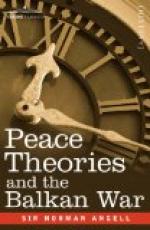In the same way, when we prevent the brigand from carrying on his trade—taking wealth by force—it is not because we believe in force as a means of livelihood, but precisely because we do not. And if, in preventing the brigand from knocking out brains, we are compelled to knock out his brains, is it because we believe in knocking out people’s brains? Or would we urge that to do so is the way to carry on a trade, or a nation, or a government, or make it the basis of human relationship?
In every civilised country, the basis of the relationship on which the community rests is this: no individual is allowed to settle his differences with another by force. But does this mean that if one threatens to take my purse, I am not allowed to use force to prevent it? That if he threatens to kill me, I am not to defend myself, because “the individual citizens are not allowed to settle their differences by force?” It is because of that, because the act of self-defence is an attempt to prevent the settlement of a difference by force, that the law justifies it.[2]
But the law would not justify me, if having disarmed my opponent, having neutralised his force by my own, and re-established the social equilibrium, I immediately proceeded to upset it, by asking him for his purse on pain of murder. I should then be settling the matter by force—I should then have ceased to be a Pacifist, and have become a Bellicist.
For that is the difference between the two conceptions: the Bellicist says: “Force alone can settle these matters; it is the final appeal; therefore fight it out. Let the best man win. When you have preponderant strength, impose your view; force the other man to your will; not because it is right, but because you are able to do so.” It is the “excellent policy” which Lord Roberts attributes to Germany and approves.
We anti-Bellicists take an exactly contrary view. We say: “To fight it out settles nothing, since it is not a question of who is stronger, but of whose view is best, and as that is not always easy to establish, it is of the utmost importance in the interest of all parties, in the long run, to keep force out of it.”
The former is the policy of the Turks. They have been obsessed with the idea that if only they had enough of physical force, ruthlessly exercised, they could solve the whole question of government, of existence for that matter, without troubling about social adjustment, understanding, equity, law, commerce; “blood and iron” were all that was needed. The success of that policy can now be judged.
And whether good or evil comes of the present war will depend upon whether the Balkan States are on the whole guided by the Bellicist principle or the opposed one. If having now momentarily eliminated force as between themselves, they re-introduce it, if the strongest, presumably Bulgaria, adopts Lord Roberts’ “excellent policy” of striking because she has the preponderant force, enters upon a career of conquest of other members of the Balkan League, and the populations of the conquered territories, using them for exploitation by military force—why then there will be no settlement and this war will have accomplished nothing save futile waste and slaughter. For they will have taken under a new flag, the pathway of the Turk to savagery, degeneration, death.




